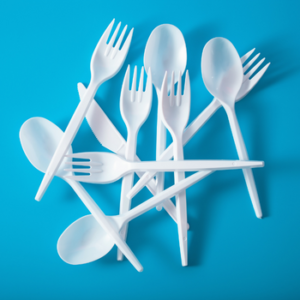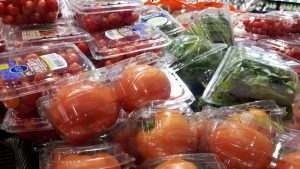Plastic bans lose support as Canadians put COVID-19 concerns first
Right up there with buffet tables, shared utensils and sampling stations, reusable cups and containers were among the first food-related casualties of COVID-19. In early March, companies including Bulk Barn and Starbucks suspended the use of reusable vessels over contagion concerns. As the outbreak edged towards a pandemic, this pause hinted at the sweeping changes to come. In the intervening months, flats of bottled water, cup lids, and disposable cutlery and containers have fed into an ever-growing raft of plastic waste.
“I remember going to a coffee shop and them saying, ‘We can’t fill your cup,’” says Robert Kitz, research associate at Dalhousie University’s Agri-Food Analytics Lab (AAL). “I think it was mere days later everything was shutting down. But that was the first little tiny step, was reusable coffee cups.”
In a new study on plastic food packaging, Kitz and his co-authors — Sylvain Charlebois, Tony Walker and Janet Music — examined how consumer attitudes have changed during the COVID-19 pandemic. To identify differences, they compared 977 responses collected between July 10 and 14 with the results of an earlier survey of 1,014 Canadians conducted between May 13 and 18, 2019.
While the number of Canadians actively avoiding plastic packaging has remained more or less the same (58 per cent in 2019 versus 60 per cent in 2020), fewer people are concerned about the environmental repercussions (91 per cent dropped to 87 per cent, with a pronounced decrease among men).
One-third of respondents reported buying more plastic-wrapped foods during the pandemic, which they primarily attributed to ordering takeout and home delivery more often (44 per cent), and heightened safety concerns (43 per cent). Fifty-five per cent of Canadians are more anxious about food safety, and 40 per cent consider new safety concerns to be either “very” or “extremely important” when it comes to weighing plastic-wrapped purchases.
Initially, the researchers expected respondents to be less worried about plastic pollution given the more immediate concerns of the pandemic. Though there was a measurable decrease, the bulk of Canadians remain engaged in the issue. “What we found was that people are still concerned about it,” says Kitz. “People are still motivated to want to do something.”
Prior to COVID-19, zero-waste grocery stores, straw bans and plastic bag bans were spreading. Now, it’s plastic pollution that’s gaining momentum: Use of single-use plastic may have grown by 250-300 per cent during the pandemic, CBC reports. As plastic use has increased, efforts to regulate it have faltered. Last summer, the federal government announced it was working on a single-use plastics ban. Due to the pandemic, those plans have since been waylaid.
The vast majority of Canadians may still be troubled by the effects of plastic pollution, but the AAL found varied attitudes when it came to policy measures. “There was really strong support for more regulations and bans on single-use plastics a year ago. When we ran our survey this summer, we saw a lot less support for that, which makes sense based on the idea that it’s less of a priority issue right now,” says Kitz.
In 2019, 90 per cent of respondents were in favour of stricter regulations and 70 per cent supported a single-use plastics ban. The most recent survey showed a drop of 11 and 12 percentage points respectively, with men reporting a significant drop in agreement.
Ocean plastics don’t care about our pandemic. The problem hasn’t gone anywhere, and we still need to find solutions. – Robert Kitz



